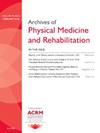Psychosocial Responses to a Cardiovascular Exercise Randomized Controlled Trial: Does Intensity Matter for Individuals Post-stroke?
IF 3.6
2区 医学
Q1 REHABILITATION
Archives of physical medicine and rehabilitation
Pub Date : 2025-06-01
DOI:10.1016/j.apmr.2025.01.468
引用次数: 0
Abstract
Objective
This study compared the effect of cardiovascular high-intensity interval training (HIIT) vs moderate-intensity continuous training (MICT) on psychosocial responses to exercise, motivation, and enjoyment, in individuals with chronic stroke.
Design
A secondary analysis of motivation and enjoyment outcomes collected from a randomized controlled trial (NCT03614585) comparing 12 weeks of HIIT vs MICT in participants with chronic stroke (6-60mo post-stroke) was conducted.
Setting
General community.
Participants
Seventy-one individuals (N=71) with chronic stroke (mean ± SD, age: 65.5 ± 8.4y, 19.4 ± 13.4mo post-stroke, 38% women) and mild disability (median ± interquartile range, National Institutes of Health Stroke Scale score 1 ± 2).
Interventions
Twelve-week, 3 per week progressive cardiovascular HIIT or MICT program conducted on NuStep recumbent steppers.
Main Outcome Measures
Motivation (Behavioral Regulation in Exercise Questionnaire-3) was measured at weeks 1, 6, and 12. Enjoyment outcomes comprised of affective response (Feeling Scale) assessed at each training session, and post-exercise enjoyment (Physical Activity Enjoyment Scale) assessed at weeks 6 and 12. Linear mixed models, examining group, time and group × time point interactions in motivation constructs and composite scores, mean affective response per session, and post-exercise enjoyment were used to compare the effect of HIIT vs MICT.
Results
HIIT elicited a lower affective response (mean difference [95% CI]: –1.18 [–1.90 to –0.47]; P=.002), that also progressively declined during sessions, in contrast to MICT (group × time point interaction: F [2,63.5]=3.99, P=.02). HIIT and MICT did not elicit any significant difference between groups or change over time for post-exercise enjoyment or any motivation constructs (P>.05).
Conclusions
Despite lower affective response during exercise, HIIT elicits equivalent motivation and post-exercise enjoyment compared to MICT. This study provides further support for the implementation of HIIT in stroke rehabilitation by demonstrating sustained responses of motivation and post-enjoyment. Future studies should consider potential strategies that positively reinforce these important psychosocial responses to implement HIIT in post-stroke rehabilitation.
心血管运动随机对照试验的心理社会反应:强度对中风后个体有影响吗?
目的:本研究比较了心血管高强度间歇训练(HIIT)和中等强度连续训练(MICT)对慢性脑卒中患者运动、动机和享受的心理社会反应的影响。设计:从一项随机对照试验(NCT03614585)中收集的动机和享受结果进行二次分析,比较慢性卒中参与者(卒中后6-60个月)12周的HIIT和MICT。设置:普通社区。参与者:71例慢性脑卒中患者(平均±SD,年龄:65.5±8.4岁,脑卒中后19.4±13.4个月,38%为女性)和轻度残疾(中位数±IQR, NIH脑卒中量表评分1±2)。干预措施:12周,每周3次/次进行渐进式心血管HIIT或MICT计划。主要结果测量:动机(运动行为调节问卷-3)于第1、6和12周测量。享受结果包括在每次训练时评估的情感反应(感觉量表),以及在第6周和第12周评估的运动后享受(体育活动享受量表)。线性混合模型,检查组,时间和组 × 时间点在动机结构和综合得分,每次平均情感反应和运动后享受方面的相互作用,用于比较HIIT与MICT的效果。结果:HIIT引起较低的情感反应(平均差异[95% CI]: -1.18 [-1.90, -0.47];p = 0.002),与MICT相比,在会议期间也逐渐下降(组 × 时间点相互作用:F[2,63.5] = 3.99,p = 0.02)。HIIT和MICT没有引起组间的显著差异,也没有随着时间的推移而改变运动后的享受或任何动机构念(p < 0.05)。结论:尽管运动期间的情感反应较低,但HIIT和MICT可以引起相同的动机和运动后享受。这项研究通过证明动机和后享受的持续反应,为HIIT在中风康复中的实施提供了进一步的支持。未来的研究应该考虑潜在的策略,积极加强这些重要的社会心理反应,在脑卒中后康复中实施HIIT。
本文章由计算机程序翻译,如有差异,请以英文原文为准。
求助全文
约1分钟内获得全文
求助全文
来源期刊
CiteScore
6.20
自引率
4.70%
发文量
495
审稿时长
38 days
期刊介绍:
The Archives of Physical Medicine and Rehabilitation publishes original, peer-reviewed research and clinical reports on important trends and developments in physical medicine and rehabilitation and related fields. This international journal brings researchers and clinicians authoritative information on the therapeutic utilization of physical, behavioral and pharmaceutical agents in providing comprehensive care for individuals with chronic illness and disabilities.
Archives began publication in 1920, publishes monthly, and is the official journal of the American Congress of Rehabilitation Medicine. Its papers are cited more often than any other rehabilitation journal.

 求助内容:
求助内容: 应助结果提醒方式:
应助结果提醒方式:


